Q&A: Dodgy Devices and Maths Mayhem
Your questions are going under our microscope and we’ll be asking our guests to give their expert insight on a number of topics. Including, Why does asparagus make your wee smell? Could plastic eating worms help prevent pollution? And what’s going to happen to the International Space Station? Plus, there’ll be our customary quiz at half time.
In this episode

Joining us this time...
Joining Chris Smith to tackle your questions this week: Lewis Dartnell, who's an astrobiologist interested in the search for microbial life on Mars and elsewhere. He's also the author of a number of books, including a new one he's just bringing out, called 'Being Human: How Our Biology Shaped World History.' What's that all about?
Lewis - For this new book, I am looking at all different aspects of us as an animal, as a species - our human-ness. Things like our genetics or our anatomy and our physiology or our psychology (things like cognitive biases) and how they've had a huge influential effect through the course of human history. How did a particular mutation in Queen Victoria end up indirectly leading to the Russian Revolution a hundred years later, for example?
Chris - Is that haemophilia?
Lewis - It is haemophilia, exactly. A single point mutation that appeared to have arisen spontaneously when she was fertilised.
Chris - And so the point you're making is that because we make the world, things that change us change the world we make?
Lewis - Yeah, exactly. So humans today, living in our glittering skyscrapers, are basically the same as our ancestors living a hundred thousand years ago in Africa. Our humanness is the same and we have been a constant throughout history. So what I'm doing through the chapters of this book is unpicking the thread of these stories of how different aspects of our biology have had these long term effects on the course of history: its themes and its trends or particular events, particular outcomes.
Chris - And what's the relation between that and the fact that you are looking for life on Mars?
Lewis - Oh, very little, to be honest. My first book, 'Life in the Universe', a Beginner's Guide, was all about astrobiology and how we're looking for aliens, how we're looking for life on other planets. But as a research field, astrobiology is very interdisciplinary. It's biology overlapping with planetary science and space science and astronomy and geology. So I've kept that sort of interdisciplinary hat on through all the books I've written. 'Being Human' will be my fifth book now, looking at science and how it overlaps with other things: science and history in this particular case.
Chris - It's great to have you with us, Lewis. Thanks for popping in. Also, here is Ems Lord who is the director of NRICH. That's Cambridge University's maths outreach programme. I should just tell everybody at home, GCSE maths starts tomorrow so I have brought in a GCSE maths question, and the reason I brought it in is because my daughter gave it to me and she said, "this is a really hard question, can you do it?" And I thought, "Oh, this is easy." And I had a go at it and thought, "no, actually, I can't, but I know a woman who can!" You've been having a go so we'll impart and share with the listeners what that question is later on. I don't know if you're making progress, but the last time you were on and the reason for that long spiel is it was the day that Sunak said, "I want to see people studying maths through to 18 and I want to increase mathematical literacy in the general population and numeracy." There's been a bit more detail added to the formula and the equation since then. Your views?
Ems - You are right there has been more background provided and that's been incredibly important because I think when we all first heard it, everyone was throwing their hands in the air going, "how are we gonna manage this? Where are we going to get the teachers? How's everyone going to manage to take A-level maths?" And I think we've got some really interesting conversations going on. How does that look for apprentices? What does it look like for A-level students right now? It's actually a really exciting time to be involved in Maths ed and be part of those conversations.
Chris - Your role in NRICH, is that really an ambassadorial role to kind of explain and show people that maths is not as scary as they might think it is?
Ems - I would never think of maths being scary!
Chris - That's because you're a mathematician! I find it a bit intimidating,
Ems - But we're all mathematicians. You are using mathematics every day. People sitting on either side of me here in the studio are using maths every day.
Chris - Well they are at the moment because we gave them the same question! They've got a page of notes as well.
Ems - But the thing is, we're all using it so we're all mathematicians just like we are all readers and we're all looking at text every day. So I think it would be good to get away from this idea that mathematics is just what you do in the classroom and look at it more as something that we do every day. It's a really useful tool and let's us do some fantastic things. Mathematics is part of our everyday lives.
Chris - Thanks Ems. Anna Ploszajski is also here this week. She's been on the programme a couple of years ago. You are a materials scientist. You're very interested in how things are made, what they're made of, and therefore the properties that what they're made of endows them with and how to give them additional properties.
Anna - Exactly right. But the difference I guess with what Lewis looks at, you know, he's looking at how biological materials and beings are made, I'm talking very much about human made stuff.
Chris - Well give us some examples of the kinds of things that, uh, float your boat?
Anna - Back in my days as a researcher, I was looking at new materials that can store hydrogen. This was with a view to being able to contribute to the vast range of materials that help us to hopefully try and mitigate climate change and create a more sustainable future. So these hydrogen storage materials, which people might be familiar with from the movie, the Glass Onion, which came out just before Christmas, these materials store hydrogen, which is normally a gas, a very lightweight gas as a solid. The benefit of that is that solids are much more dense and it means that we can carry around a lot more hydrogen with us in a smaller and more lightweight way. The reason that we'd want to do that is that hydrogen contains a lot of available energy, so we can also make hydrogen from plain water. So it represents a really exciting potential new energy source for a really sustainable future if we can crack a few of the material science conundrums.
Chris - It sounds like we need breakthroughs like that because I saw an alarming headline this week that we are predicted to breach the Paris agreements 1.5 degree temperature target by 2027. I mean this is just a handful of years away.
Anna - It's a very, very scary statistic. Time really is of the essence for us all to pull together in order to do what we can to help mitigate the damage from climate change.
Chris - That's Anna Ploszajski, she's a materials scientist. We'll be talking to her about the materials that we use and the materials that we don't yet use or don't even yet know exist that we could put to useful uses out there in the wider world. Also with is Xander Byrne who is an astronomer. He's from the Institute of Astronomy at the University of Cambridge. What do you work on?
Xander - I'm just about to start my PhD, actually. I'll probably be doing something to do with modelling planets around other stars, perhaps looking at the atmospheres and getting an idea of what they're made of, perhaps with a view as well to assess how habitable these planets might be.
Chris - There was a report in the paper this week about a massive explosion that astronomers dubbed the biggest explosion they had ever seen. What was that?
Xander - It's called Scary Barbie.
Chris - Who names that?
Xander - Well, the acronym for the way that it was catalogued was ZTF20ABRBEIE.
Chris - Trips off the tongue doesn't it. I can see why they may have wanted to rename it.
Xander - Exactly. Astronomers are really, really bad at naming things.
Chris - Where did it happen?
Xander - It happened in a very distant galaxy. Astronomers always have a bit of trouble working out how far away things are because if you see something bright, it could just be something really, really bright very far away. Or it could just be really close by.
Chris - So what blew up?
Xander - It's not exactly known. There's two major competing theories about what it was, but the best theory that we seem to have at the moment is that it was a cloud of gas falling onto a super massive black hole. This would probably be something about a hundred million times the mass of the sun - the black hole, that is - and then the gas fell onto it, heated up, got to incredibly high temperatures, burst into this big explosion a hundred times the size of the solar system.
Chris - How did they spot this? Are there telescopes scanning the sky for these sudden emergences of bright lights and things all the time then?
Xander - It was discovered by a facility called the Zwicky Transit Facility.
Chris - Well that's brilliant. So if you have any space science questions or any questions on maths, any questions on materials science, or astrobiology - life on Mars, then now's your chance to have them answered by our dream team.
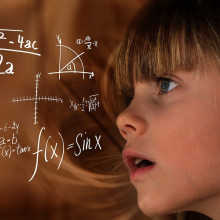
09:56 - Are you smarter than a 16 year old?
Are you smarter than a 16 year old?
Chris Smith put this question to mathematician Ems Lord...
Ems - I think when you have questions like this, and you have to spend so long getting your head around it, it then comes back how we solve problems? I think the first thing is trying to put it into your own words: absolutely key. And just having that really good strategy. But even then, because you've got those two different parts to it, there's a lot going on and there's quite a few different strategies you can use. I don't recommend trying to solve the problem at the same time as talking on the radio. I do think that's a little bit of a challenge, but there you go.
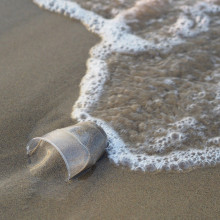
11:21 - Are "biodegradable" plastics just greenwashing?
Are "biodegradable" plastics just greenwashing?
Chris Smith put this question to Anna Ploszajski...
Anna - One thing that we have to be really careful about when we talk about materials, but also things that are good and bad for the environment is this word being "better" - this kind of value judgement of how good a material is. It can either be polluting or it can be something that gets into the bellies of sea turtles, but calling it better or good and bad I think is a little bit tricky to get our head around. With biodegrading, it's important to think about what is it that we want these materials to do, because I think when we talk about things being better for the environment, ideally what we want is for the stuff that we make and produce and use and then dispose of to have, ideally, zero impact on our natural environment. The holy grail really for materials is that they exist in what we call a circular material economy in the same way that, in the natural world, all the materials that are produced by plants and animals come from other plants and animals and eventually end up going back to plants and animals. And so if we were to think about our ideal situation for what we do with our materials, it would be a very good idea to look at the natural world and how the natural world creates this extremely circular material economy. Our man made material economy is pretty linear. We dig stuff out of the ground, we use it, we throw it away. So to look at the natural world, how does it actually recycle its materials? A lot of the time it degrades, which means that little bugs and worms and bacteria and fungi come along and they use those substances, those materials, as food quite often. Or a place to live. Our materials that we are making, our synthetic materials that are able to biodegrade, what we are hoping for are bacteria and worms, that will be able to find the stuff that we make a useful nutrient source.
Chris - And is it possible to do that, Anna?
Anna - It is. In 2016, scientists found that there are types of bacteria that consume the sorts of polymers that we make in a synthetic way. The problem though is that the situation, the environment that you need, the conditions that you need for that to happen, are often very specific. So when we talk about biodegradable materials, what we're hoping is that the end products are going to be friendly, and are going to not harm any animals in the environment. Unfortunately, a lot of biodegradable materials either don't fully biodegrade, so they break down into microplastics, which then wreak even more havoc to the environment, or they degrade into substances that are basically like liquid polymers or liquid plastics, which can even more easily get into our ecosystems and start causing havoc there. So we need to be careful about if we are just creating biodegradable materials, we need to make sure that the actual products that they are degrading into are going to be okay for the environment still.

15:16 - Is there an evolutionary benefit of friendship?
Is there an evolutionary benefit of friendship?
Chris Smith put this question to astronbiologist Lewis Dartnell...
Lewis - One of the central things that psychologists have been trying to understand about human behaviour is why we're just so good at helping each other out. We're very cooperative, we're very altruistic to each other and one of the best explanations for why people help each other out and indeed why animals of the same species help each other out in general is called reciprocal altruism. So if I help you out, then a bit later you help me out and we've both increased our fitness and helped our own survival. The problem with that though is you have to run some kind of ledger, or log about who has helped you in the past and who has cheated you by taking your help and then not returning the favour later. So you don't want to do too much of that, of trying to remember from all the other people in your community or in your society who cheated you or who's helped you in the past. So if you develop a particularly close relationship or association with another individual, i.e. you develop a friendship, you no longer really have to bother remembering every time you've helped them or they've helped you. You just come to trust them that they'll return the favour later. It sort of simplifies that whole behavioural problem.
Xander - Sounds like a way of trying to not have to pay your friends back for things!
Lewis - I think you can assume that by the time you've forged this close relationship with someone, which we call in humans "friendship", you kind of trust them. And if someone cheats you enough times and doesn't return that favour for the 16th week running, the friendship breaks down. They cease to be your friend, right?
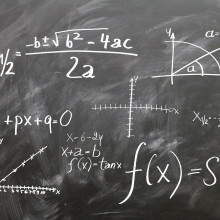
17:37 - Are maths questions written poorly?
Are maths questions written poorly?
Chris Smith asked mathematician Ems Lord, astrobiologist Lewis Dartnell, and space scientist Xander Byrne to take a look at this GCSE maths question...
Ems - A good maths question is one you want to solve. And looking at this question, I think my first reaction was, and I don't think I'm the only one in this room who thought the same way, "how fast can I get out of here." It's not something that you wake up and think that's the sort of question I want to solve when I do my maths. And I think it's really important that we set engaging questions and ones that link to real life.
Chris - I was laughing because we've got a brainpan in here the size of a planet. The IQ of you lot combined is into hundreds and hundreds. All of you were scribbling. Xander, what do you think of this question?
Xander - Halfway through reading this one, I just got bored. It's so long and I think it said it was four marks for this question?
Ems - I think with something like this, you can't lose interest in it. You've got to be really engaged. So I think that's the first thing, have a straightforward question with some really great maths in. We also have to think about the reading level because not everybody who is great at maths is necessarily great at the reading. And this takes a lot of comprehension to get your head around. And let's face it, reading comprehension has been a lot in the news with younger children in the last week and the publication of the SATS paper today. So, you know, on the comprehension side it's challenging. I can see they've tried to do real life, 'mobile phones, televisions', but really? It's probably an example of a question written by a mathematician trying to think about real life, but perhaps not quite with the children. And I think there was a good question a few years ago about sweets and when somebody was sharing some sweets and that also hit the headlines with everybody trying to solve that one when they came out of the exam room.
Lewis - I've got an answer and I'd be curious if you've got the same answer, but what I like about this kind of question is it's challenging how well you can basically do translation between different languages. How can you take this slightly awkwardly phrased English sentence and then write it as a maths sentence. And you get two equations, simultaneous equations, and you merge them together and out the end pops two answers, two numbers, and it's kind of satisfying. You've solved a puzzle. Although I really couldn't care less about the answer.
Chris - What is really interesting is that both of you have sort of said it's about translation, these questions. It's about taking what someone has set as a challenge in English and you've got to translate it into maths speak, but your maths speak. Ems, can you put us out of our misery now and tell us how to do it?
Ems - Now you've got somebody here who's the director of NRICH, and what we try to do is give hints and tips. So when I've been scribbling, I've been trying to think of the different ways that students might do this to give hints and tips. And what I would say is one of my colleagues, who was also called Chris, had a really lovely way of solving these problems when the numbers get a little bit challenging. And he said, think of something that's a little bit simpler. So forget about adding on these numbers, maybe you've got a 20 pound note and you're going to be sharing it in a simple ratio, maybe two to three. How are you going to do that? So make it simple to begin with. And once you've had that chance to play with it on a much more simple level and you can put it into your own words a little bit more easily, then you can do what we've all been doing here, scribbling away with a simultaneous equation. So that would be my answer.
Chris - You have to put us out of our misery and tell us how to do it and what the answer is.
Lewis - So I wrote two sentences in maths. My first sentence was X plus 40 over Y plus 40 equals 15 over 22. And then similarly with the second sentence in maths language: X minus a hundred over Y minus a hundred equals eight over 15. And then you multiply it all out and you get X equals some gubbins and then you substitute that gubbins into the other equation and then you churn through the gears of maths and it's like four or five lines of scribbles until the answer just plops out at the end.
Xander - More or less. Sometimes you can kind of see tricks with this. I've been doing an obscene amount of maths for my degree, so occasionally I spot shortcuts. One equation subtracted from the other gives seven x minus seven Y equals something and then you can divide by seven and get it. I have a simpler thing in terms of just x and y rather than any factors out the front. So there are shortcuts you can get with enough experience.
Chris - I'm relieved that you solved it. It was the English that killed it rather than the maths. It's not hard maths, it's just hard to turn into maths speak, I think.
Ems - And I think that shows the skill in writing questions and that sometimes perhaps even though folk are very well meaning they don't always get it quite right.
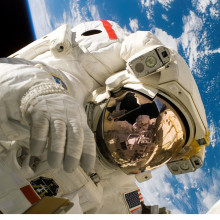
24:53 - Will microgravity stop us colonising exoplanets?
Will microgravity stop us colonising exoplanets?
Chris Smith put this question to Cambridge University space scientist Xander Byrne...
Xander - Yeah, there's quite a few difficulties that we have with microgravity. We have been experiencing lots of different conditions as we've been evolving, but the earth's gravity has been a complete constant throughout all of that. So we've really adapted to precisely the gravity that we experience on earth. There are a few things that people find when astronauts come back from the International Space Station. There was one study in particular, which was quite cool because they had a pair of twins, one of whom was an astronaut and went up there and one of whom stayed on earth so that when he came back they were able to compare between the two. But the main things that you get are decreased bone density, as the question said, that decreases I think by about 1 or 2% per month, which is quite significant. Your muscle mass goes down obviously, because you don't have to fight gravity all the time. There's a particular problem with the heart because normally, here on earth, the heart has to pump blood upwards to the head, but in space you don't have to do that. So your heart kind of atrophies over time and then you have decreased blood pressure and it's starts to become a problem.
Ems - Was just thinking when you were talking about all of that, the news the other day that they're training the first astronaut who has an artificial limb and the difficulties that they were facing when they're training on that vomit comet with trying to get their leg to bend.
Xander - In pretty much any field of life, if you have a disability, often people don't think about that kind of thing when they're designing the experiences people are going to have.
Chris - So in other words, yeah, it will be a problem, but it can be surmounted. We need to think about the fact that our physiology isn't necessarily adapted to these other places and compensate, whether that's compensating with drugs, with exercise, or with other ways of keeping people fit and healthy.
Xander - And the way that they typically try and mitigate this kind of thing is primarily by exercise. I mean, there was a great example, Tim Peake, when he was still up there, he ran a marathon. And the way it worked is he was on a treadmill and he was kind of strapped downwards to the floor.
Chris - You've got to load your muscles and your bones, otherwise they fall apart and atrophy and you come home with the skeleton of a 70 year old.
Xander - When they come back to earth, they do typically have some moderate physiotherapy that they have to go through to be a functioning person again once they come back.

Let's get quizzical!
It's general (science) knowledge quiz time for the panellists mathematician Ems Lord, space scientist Xander Byrne, materials scientist Anna Ploszajski and astrobiologist Lewis Dartnell...
Chris - And now it is that part of the programme where the teams compete to see who has one of the biggest brains and who on the other hand is going to go home with their academic tail between their legs because it is quiz time. You at home of course can play along too. We have team one who are Lewis and Ems, and team two who are Xander and Anna. And that means that on each team there is someone who has won the quiz before. So one of you is going to go home, formerly a winner, becoming a loser. So round one is called imposter syndrome. So team one Lewis and Ems, a little earlier, we heard the onset of exam season can leave many young people with a sense that they don't deserve to be excelling in their studies or worthy of their desired career path. This is the so-called imposter syndrome. So can our teams spot the imposters in this round? Team one, which of these is not a real animal? Is it A) The Giant Dwarf bat B) the Fried Egg jellyfish, or C) the Pleasing fungus beetle? What do you think Lewis and Ems?
Lewis - Um, I think the Fried Egg jellyfish is a real thing. Giant Dwarf bat is kind of a contradiction in its own terms. So you think that it doesn't really exist, but also as astronomers are bad at naming things, biologists can be pretty bad at times as well. So I wonder if they found a dwarf bat and then found a chuffing big one a few years later. What do you feel, Ems?
Ems - I'm speaking as someone who has a bat detector. I'm just trying to think when I've read anything about giant dwarf bats. We've got Daubentons' here in Cambridge down by the river. I've not come across them. That doesn't mean they don't exist. Possibly not in Cambridge. The second one I was thinking no way but you are keen on that?
Lewis - I just thought jellyfish kind of looked like fried eggs anyway, so why not?
Chris - We're gonna have to hurry you.
Lewis - I think Giant Dwarf bat. The fact that I'm a biologist I think should add no weight whatsoever to my gut instinct though.
Ems - The fact that you are a biologist, I'm willing to go with you.
Lewis - It's going to be on me!
Chris - You're going for the bat and you are correct. Streaking into the lead on the Naked Scientist Big Brain of the Week quiz. Yes, you're correct. The Fried Egg jellyfish does what it says on the tin. It is a jellyfish, it's found in the Med, it has an orange mass on the top which makes it look like a sunny side up egg. The Pleasing Fungus Beetle is so-called because it's a completely harmless beetle that eats fungus. The Giant Dwarf bat is one we made up earlier. Well done to team one, Lewis and Ems. You are currently in the lead with one point. Which of these, team two, scientists never won a Nobel Prize in physics? This is for Xander and Anna. Is it A) Stephen Hawking B) Albert Einstein or C) Niels Bohr? What do you both reckon?
Xander - I think I know this because Albert Einstein did win a Nobel Prize. It wasn't for relativity though, which some people are a bit confused by. I'm pretty sure Niels Bohr did. That was around the time when there weren't very many physicists and not very much stuff was happening. So I wonder if maybe Stephen Hawking was crowded out and didn't get one?
Anna - That was my gut instinct as well, Hawking. It's also Cambridge themed obviously. So maybe we should think that was a hint as well.
Chris - Yeah. Well done both of you. You did indeed correctly identify Stephen Hawking as the imposter. Despite all of his revolutionary work on black holes, Stephen Hawking never netted a Nobel Prize. Einstein for all his work on space time got a prize for the photoelectric effect, and Bohr is one of the mastering big brains behind quantum mechanics. So far we go into round two and it's level pegging with both teams on one each. The next round is called Tech Yes or Tech No. You spot the fake from this strange list of sublime gadgets. So back to Ems and Lewis. Which is the one we made up? The Tech No in this list of strange tech. A) the smart oven with an inbuilt camera that live streams your baked goods to your mobile phone. B) the Play-Doh 3D printer or C) a pair of headphones that double up as a mask to filter the air you are breathing in. What do you both think about that?
Lewis - They're all suspiciously distinct and things that could have been invented. I think the headphones with the mask is probably a real thing. I think the Play-Doh 3D printer is probably a real thing. I can imagine you can just squeeze it from a syringe and extrude Play-Doh as you move it around. Sort of thing.
Ems - Well, thinking about that 3D printer, likewise I had the Play-Doh when I was younger. But also, my nephew runs a factory that makes 3D printers. The idea of Play-Doh makes sense. I'm going for the smart oven here.
Chris - You think that's fake? Unfortunately that's wrong.The 3D Play-Doh printer is the dodgy one that we made up. The smart oven is indeed real. It's made by Samsung. The headphones are also real, Dyson made that one. The Play-Doh 3D printer was an April Fool's prank allegedly. Team two, you've got to separate the fake from the real. A) a smartphone for left-handed people. B) the air bonsai levitating pot plant or C) the selfie toaster which sears your face onto a piece of bread. Which of those is Tech Yes and which, Xander and Anna, is Tech No?
Xander - Selfie toaster is a hundred percent real.
Anna - I completely agree with you. Self-absorbed.
Anna - I totally agree. In fact, I really desperately want one. Levitating bonsai?
Xander - Again, I can believe that. I can sort of imagine you could have a kind of magnet thing, but a left-handed smartphone, what would that even be, conceptually? It's, yeah,
Anna - It's just different software, right? And I'm sure there must be a setting that you can just switch around.
Xander - Yeah. So presumably you don't need a separate device for that?
Anna - A separate device wouldn't be necessary. So I I reckon it's A again, the smart phone
Chris - It is! The selfie toaster, your instinct was quite right, it is the real deal. The levitating plant pot is the same. There isn't such a thing as a left-handed smartphone per se. Phones are mainly designed for right-handed people, but some devices, as Anna suggests, let you switch your home screen interface around to cater for people who are left-handed. Well done. You are currently in the lead 2-1. So it's all on this. Back to Ems and Lewis. This is called Big and Broken Noses this round. Are you ready? Why have the rugby sides the Saracens and Sale Sharks decided to wear their away kits in the English Premiership final on the 27th of May? Is it A) that statistically a rugby team that wears a home kit is more likely to lose a cup final. Is it B) the scientists have found that the away kits of both sides are significantly more aerodynamic? Or is it C) because there's a clash for colour blind viewers and players?
Lewis - We're thinking C immediately, aren't we?
Ems - So much in the news recently about colour blindness and more awareness. I'm kind of going for C.
Lewis - The more aerodynamic sounded ridiculous. There is a definite advantage to playing on your home ground. So it's definitely not A.
Chris - You're going for this colour blindness. It absolutely is. Saracens have worn their black home strip against Sale who have a maroon away kit, but there were concerns that the black on the red colour combination would make it difficult for colour blind supporters and players to differentiate between the teams. Well done. Point for you. Back to Anna and Xander. Researchers have claimed that a tall nose may be a sign of what? Is this a sign of A) a very high IQ B) Neanderthal heritage or C) a shorter than average life expectancy? What do you both think?
Xander - That's a tough one. IQ? I think scientists are generally kind of going away from as a concept, right?
Anna - I agree. It's a little bit eugenics, isn't it?
Xander - A little bit, yeah, it could be Neanderthal.
Chris - We're not tempted by not living so long?
Xander - There's just so many factors behind my lifespan, right? I reckon it's the Neanderthal one. I don't know about you?
Anna - I'm torn between those two. Maybe the shape of your nose dictates how well bugs can get up your nose?
Xander - Not sure that's the limiting factor on my lifespan. I reckon Neanderthal.
Anna - Yeah let's go with that one. Go with Neanderthal.
Chris - You get a point for that one! Which means we don't have to go to a tiebreaker. We should give Xander and Anna a round of applause. You are this week's winners!
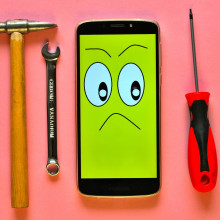
39:36 - Are materials to blame for broken gadgets?
Are materials to blame for broken gadgets?
Chris Smith put this question to Anna Ploszajski...
Anna - Materials will be certainly a factor, particularly if the aim is to make cheap, short lasting products. The cheaper the materials, generally the weaker and poorer their properties. But I generally think of this more as a design question. It's about whether we can design products and devices that can be easily accessed, easily opened up. And can the manufacturers develop an economy for producing and distributing spare parts?
Chris - I must admit that I think if you asked people, have you got an old gadget from X number of years ago, they'll say yes. And then you say, have you got an old gadget that you've been able to repair from just last week? And they'll say no. So we seem to have shifted into the situation where it is impossible to repair things, but is that just because they're so complicated it moves what is repairable just out of the domestic reach?
Anna - That's definitely a part of it, yeah. You know, if you ask me to try and reconfigure the software on my phone, I absolutely would not have that knowledge. The access that we have to the internet now means that knowledge is at our fingertips. And so the kind of pooled resources of people that do have the skills to fix stuff in big repositories online is a really empowering and fantastic thing. There's a brilliant website called iFixit where people have uploaded all sorts of different ways that you can fix your devices. Even complicated things that seem like you wouldn't be able to, like laptops and smartphones. The how-to guides are on there. They're designed for everyday people who aren't experts, handy people to be able to access this stuff. So there is a movement, a kind of collective movement to be able to fix this stuff. That Right to Repair movement is taking off massively, but it's going to really rely on manufacturers as well getting on board and making it much easier for us to do so.
Chris - It's amazing what you can learn on YouTube though, isn't it? I've learned tons there

42:27 - Why does asparagus make your wee smell?
Why does asparagus make your wee smell?
Chris Smith put this question to Lewis Dartnell...
Lewis - Yes, give the biologist the wee question. It is a really, really good question. And what's going on with the asparagus is that your body is metabolising the compounds and the food molecules and the asparagus that you eat and creating sulphur containing compounds. Sulphur containing compounds often tend to be a bit pongy. For example, the smell of rotting eggs is another sulphurous compound. So when you eat asparagus, the molecules pass through your body and you excrete them back out of your body through your pee. But the reason you don't smell it on your breath is that, unlike alcohol, where the alcohol is evaporating back out of your mouth and you can therefore smell it in your breath, the asparagus smell has been in your bloodstream, then excreted through your blood in urine. So there's two different systems going on there if you like.
Chris - But if it's making wee smelly, then it must be volatile out of the urine and coming up into the room. So if it's in your bloodstream to get into your wee, why doesn't it come out of your mouth?
Lewis - Well, Chris, you have backed me into this corner. If you were to drink your wee, then have that wet urine in your mouth and then breathe. You would now smell asparagus wee on your breath.
Chris - I'll leave you to do the experiment, like Ems did her maths equation you can do the experiment next time. Lewis, thank you very much for that.
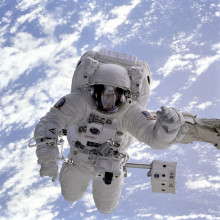
What's going to happen to the ISS?
Chris Smith put this question to Cambridge University space scientist Xander Byrne...
Xander - The reason that they're doing it is because it's getting on a bit. It's been up there, various parts have been there since the mid nineties. Certain modules that are going in are sort of degrading over time. Bits of it don't work as well as they used to. There are sometimes problems with the modules on the station. These are usually fixed by the astronauts there, but the problems are getting more frequent and more difficult and expensive to repair. The ISS itself is, by some estimates, the most expensive thing full stop. Estimated between 100-200 billion dollars. So they're really keen to cut down on that, obviously.
Chris - We also spoke on the programme last week about the fact that this is becoming a commercial initiative. We had the report on the project involving Elon Musk's company, and one other collaborator, to put commercial space stations up there starting in just two years time. And the fact they're making space a commercial domain rather than an international collaborative scientific domain, they'll still do those things, but it's very much something that they think that they can get it paid for by people buying tickets and they're so confident they've already sold tickets at $350,000 a pop.
Xander - And that's exactly why it works. There are always going to be people with this amount of money to throw away, for a very, very short trip into space.

46:03 - Why can't I help my kids with their homework?
Why can't I help my kids with their homework?
Chris Smith put this question to Cambridge mathematician, Ems Lord...
Ems - Really good question John, and I'm really sorry that that's been happening to your family. I think it comes back to what our expectations are of homework and there's so many different ways that we can support children at home with their maths or any other homework. One way is sitting down and actually doing the homework with them, but that's not the only way. Making sure there's a space to work, somewhere nice and quiet. Checking that they've got the homework, checking that they've finished it, being there to answer any questions, they're all important too. Now in this instance, it sounds like it was something pretty challenging because John was struggling with it. So how do we get over that problem? And perhaps it's time to rethink what we send home as opposed to what we do in the classroom. In the classroom, we've got professionals who understand the strategies and the journey that the children are on and some of those strategies have changed over time as well. So rather than sending home new things that the children are less familiar with, use homework as an opportunity to reinforce and practice and maybe play mathematical games together. If it's fun and you can join in together, that can work really well. We did a project called Solving Together where we did just that and we did before and after. And the before sketches of doing homework were young students in their rooms by themselves doing homework. The after were sketches of family and friends sat together playing maths games, having a great time. So it can be done. It just needs that rethink of what we mean by homework.
Chris - Hear, hear on that one.
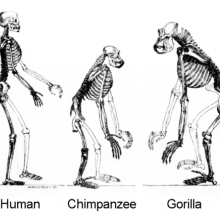
48:09 - Will humans evolve into a different species?
Will humans evolve into a different species?
Chris Smith put this question to astrobiologist Lewis Dartnell...
Lewis - This links into the question that Xander had earlier. I think what's going on when your body is adapting to microgravity is actually your body's doing something really clever. It's doing its best to adapt to a new environment and actually by doing things like decreasing your bone density and reducing your muscle mass, it's doing a very good job of adapting to that new microgravity environment. And it only becomes a problem when you come back down to earth and suddenly there's this gravity tugging away at you. But if you were consigned to spend the rest of your life in microgravity, maybe you become some kind of shuttle pilot between Earth and Mars and back again, you maybe don't mind that much that your body's now adapted to this microgravity environment because it suits your workplace. It suits the lifestyle you've got now. But if we're looking over a much longer time scale, over the time scale over which evolution happens, it's not really so much how far away from earth and across the galaxy you would have to be before evolution would start kicking in. How long would you need to wait? And so when we do have Martians, boys and girls who are born on Mars from parents who've gone there as astronauts, they won't so much as evolve, but their bodies will have permanently adapted to this new environment. They're likely to be quite tall and spindly because their entire skeleton body has developed and grown in one third Earth gravity. They would probably end up being banished gravitationally. They would never then be able to go visit their home world of earth because their body is simply not capable of standing up to gravity.
Chris - That's pause for thought, isn't it?
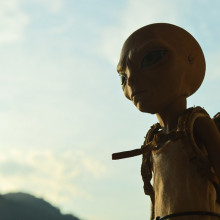
49:56 - Will alien life be carbon based?
Will alien life be carbon based?
Chris Smith put this question to Cambridge University space scientist Xander Byrne...
Xander - It may not be the only one. People tend to disagree about this a little bit. The one that's often touted as a potential other material that could be useful for this is silicon, right? Because silicon chemically operates quite similarly to carbon in some ways. If you look on a periodic table, silicon is just below carbon. And so chemically they work quite analogously in many cases. The main reason that carbon is so good is because you can make very, very long molecules with it. You can, in theory, have a chain of carbon atoms as long as you like, and you can have a stable molecule as long as it's bounded by lots of other hydrogen atoms and things. But I think for silicon, the longest chain of silicon atoms you can have in a molecule before it starts to break apart a bit is something like 11 atoms of silicon. Beyond that, it's just not a stable molecule. So carbon is really the best for this kind of thing. It's quite difficult to imagine what life could even possibly be like using any other element.
Chris - Does this mean then, Lewis, that if we are looking for life elsewhere across the universe, that probably it will have centred on the same chemical solution that life has here on earth?
Lewis - As astrobiologists, we tend to be focusing on carbon based life or organic based life. Firstly, we know it works. We're good examples of carbon life. But also we're very good at finding carbon based life. We find it in places where it shouldn't be - in hospital surgical theatres or in your bloodstream if you've got an infection. For all the reasons Xander was just saying, we don't think there are viable alternatives to organic chemistry for life as we would know it, but maybe there might be alternatives to water-based life, maybe life on another planet or moon could be ammonia based as it's wet stuff, as it's biosolvent, rather than water. Because ammonia's also pretty good at dissolving lots of different sorts of things.
Chris - So we keep an open mind basically.
Lewis - You try to think outside the box. You don't want to be too blinkered or too focused when you're looking for something which might by definition be alien, be different to how we are.
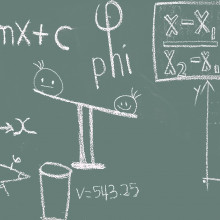
52:18 - What do students think about even more maths?
What do students think about even more maths?
Chris Smith put this question to Cambridge University mathematician Ems Lord...
Ems - The feedback varied. Some students, as you know, absolutely love maths and can't get enough of it, so they're very keen and enthusiastic, but there's others, let's face it, who've had bad experiences and are really not keen. So it's a mixed bag and I think it comes back to the way that we assess the subject and their experiences perhaps when they're first going to work. I talked to somebody whose partner runs an engineering firm the other day, and they were saying when they're interviewing, the students can walk in with their GCSE maths, but actually what they get them to do is some practical work. Check they can actually use a ruler and do basic skills because although they've got their GCSE the way it's marked, it doesn't mean you actually have all the basic skills. So employers still have to check. So I think there's that frustrating side that you've got a piece of paper, but it doesn't mean you can do the skill. Whereas if you've got a driving license, you wouldn't have been let loose on the road unless you had those basic competencies. So it's a little bit of frustration as well.
Chris - It's almost like an apprenticeship for Maths then. It's about not just having a bit of paper having been shown some techniques. It's knowing how to use them.
Ems - Exactly. It's not enough, just saying 'I can do some of these basic things.' It's being able to demonstrate it and use it in a real life context, and we haven't quite got that right. But luckily at the moment there's a lot of discussion about assessment. So perhaps this is a time where people are more receptive to maybe looking at different ways of doing things and hopefully move forward.

54:13 - Can you play a chocolate trumpet?
Can you play a chocolate trumpet?
Chris Smith put this question to materials scientist Anna Ploszajski...
Anna - I was, yeah. I brought my talk 'A materials and making odyssey' to the Royal Institution. It was sort of an unofficial rebook launch for my book, 'Handmade - A Scientist Search for Meaning Through Making', which originally came out in 2021 and the paperback has just been released. And the talk really is a sort of romp through lots of different materials. And the story of the book is how I am a relatively theoretical scientist of materials in that I understood the theories and formulae about how the materials properties came about from atoms transforming that understanding into somebody who understands how materials work in the hand in the world of the craftspeople. So the story of the book and the story of the talk is really, you know, what happens if you put a scientist into a blacksmith's workshop or a glass blower's lab? How can we relate what we see in the world of craft, the world of science, and vice versa? And the wonderful team at the Royal Institution made so many fantastic demos for me, including trumpets made out of chocolate, concrete jelly and ice. And we did lots of experiments with what happens when you try to make things out of different materials.
Chris - I'm intrigued Intrigued. Did they work? Could you blow them?
Anna - They all worked and funnily enough, you can play them fine. And they all sound exactly the same because what makes a trumpet sound is the air vibrating inside. It's the shape of the thing way more than the material that it's made out of.
Chris - I can think that the chocolate trumpet would be popular for a while until it got warm and left itself all over your hands, but you might get tempted to eat the mouthpiece, the concrete one sounds like it would give you very big arms trying to lift that.
Anna - Yeah, it was very heavy to lift and the jelly one tasted delicious. Even without eating it, you could sort of taste it as you played <laugh>
Chris - Quite distracting when you're trying to make beautiful music.

56:19 - How is AI changing science for good?
How is AI changing science for good?
Chris Smith put this question to materials scientist Anna Ploszajski, astrobiologist Lewis Dartnell, mathematician Ems Lord, and materials scientist Anna Ploszajski...
Xander - Absolutely. I mean, astronomy as a very kind of data-driven field, we sort of have more data than we know what to do with. And machine learning in particular, that particular discipline of AI, is especially useful for picking out the interesting patterns in all of the noise, finding the useful bits of information through these swarms of data that we're getting.
Chris - And EMS is the fact that the government appreciate we're going to need a lot of people who are very good at making, using and deploying this sort of software, the reason they're so interested in maths, because you can't write computer code if you're not at least reasonably versed in maths.
Ems - I think that's part of it. But when we're looking at these chatbots and you can put in your questions, they actually can be incredibly valuable.
Chris - Have you tried solving any maths equations with one?
Ems - Well, what I've done is I've been putting in NRICH questions and I've put in some questions for primary aged children. I've put in questions for five year olds just to see what it would come out with.
Chris - I'd not thought of that. What does it do?
Ems - I mean, it's learning as it goes along. So to begin with, I can ask a question. We've got one called Eggs and Baskets, and you get clues about how many eggs in each basket. You've got to work it out for five year olds. The answer it gained the first time was comparable to that GCSE question. Lots of Xs and Ys and Zs. And I put in, 'well, you know, thank you. However, could you answer it in the style of a five year old?' And then it started using words rather than algebra. And then because it seemed wordy, and these are five year olds, I said, 'well, what sort of diagram might you draw? What kind of sketch?' And so it's that little skill about knowing what questions to ask. So it's not just typing something in, but it's asking the question that will be helpful. So, not just what's the answer, but how did you get it? What strategies might I use?
Chris - Did it reveal it's working? Did it show it's working in, in sort of exam speak? Because that's one of the criticisms that many individuals level at AI that they're not explainable. They can't tell you how they got to the answer they did unless of course they've gone and got it from somewhere else on the internet, seen your question that you've thrown at it before, and they've just dredged up that bit of information and parroted it.
Ems - They did come up with quite a good reasoning explanation, which wasn't the same as any that we'd got on the website already. What would concern me is the lack of visualisation at the moment, but that's an area they're working on as well. So I really value diagrams, visuals. They're great for explaining to people the thinking behind the problem. And also, if I'm looking at something a bit more academic, I'm not getting the references at the moment where they've been looking. So do they mine our own questions? Where have they got those from? But the actual range of strategies, you can encourage it to suggest different ways. That's really valuable for a student who's stuck and just doesn't get one way they can get another. And the first few lines can act as a hint. So if you're learning to problem solve, if you use it the right way, it can be really useful.
Chris - And in astrobiology Lewis, useful?
Lewis - Yeah for similar reasons as Xander was saying with astrophysics. Churning through the data and looking for patterns. But, my sort of university post actually did a lot of lecturing and marking essays from students, and we've basically now passed a threshold where these language models are good enough that it's practically impossible to tell if a student has cheated. If they've plagiarised and they've obviously cut and pasted a paragraph off Wikipedia, you can only find that very easily, but prove that it is the case. If they've used a language model to create an essay, you can't prove that has happened, because you can run the same language model on the same prompt a second time and it comes up with something completely different.
Chris - You're obviously much better informed and well versed in your subject than the lecturers who were teaching Michael Crichton, who wrote Jurassic Park, because in his autobiography he says, when he was at Harvard, he originally started studying English before he switched to medicine. And he said he got so dispirited and disillusioned with his teachers. In the end he started handing in tracks of famous poets and famous writers, <laugh>, and they wouldn mark that. He said, 'when Blake got a C, I realised English was not for me', at least at Harvard, and switched to medicine. So it was medicine. And ultimately Hollywood that he, he did that. Material science must be a massive beneficiary of this sort of machine learning technology, Anna, for sort of doing the engineering with atoms and working out recipes for novel materials and arrangements of atoms that your subject involves.
Anna - Absolutely. In fact, I can remember during my PhD, a lot of material science is to do with, as you say, the arrangements of atoms inside materials and machine learning can help us to predict where those atoms will sit because there's a lot of very distinct symmetry and the sizes of atoms, for example. So these machine learning algorithms can really help us to predict where the atoms are going to sit if you give them these different parameters, for example. And, I use those during my PhD to solve new crystalline structures that we didn't know about before.
Related Content
- Previous How do we reduce emissions from fertilisers?
- Next We got a PSVR2!










Comments
Add a comment